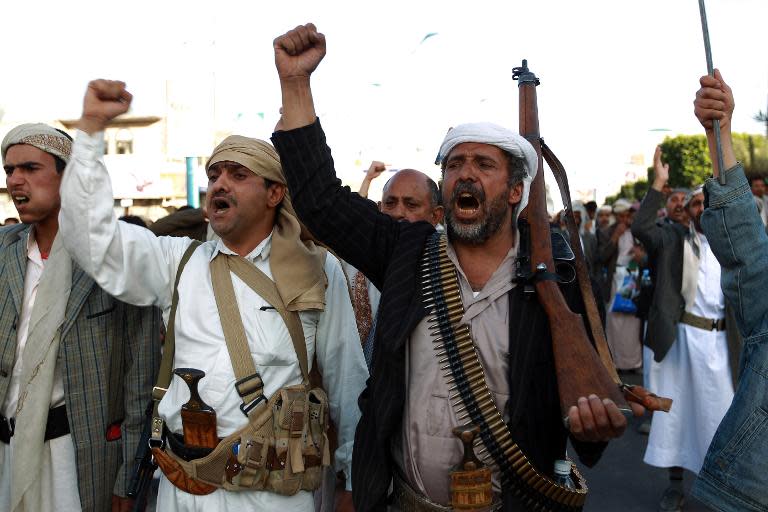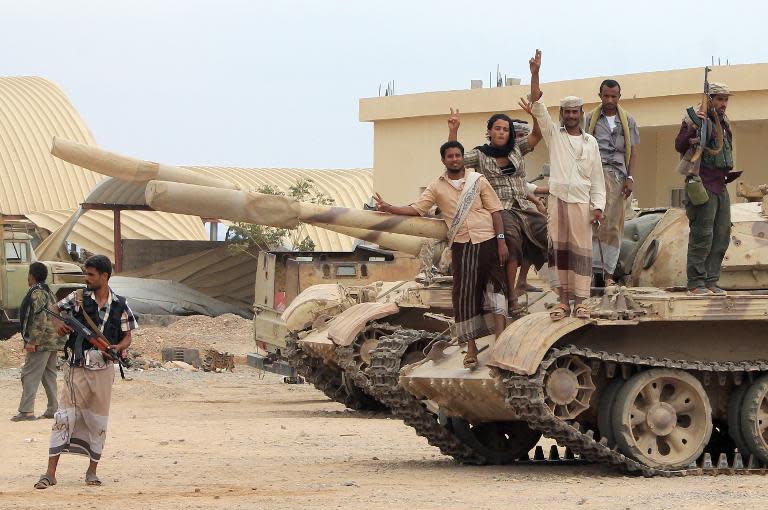Yemen leader taken to 'secure location' as rebels advance
Yemen's leader was rushed to a "secure location" Wednesday as rebel forces bore down on his southern stronghold and a warplane attacked his presidential complex, prompting pleas for urgent intervention. The escalating turmoil has stoked fears that Yemen -- a front line in the US battle against Al-Qaeda -- is teetering on the brink of all-out civil war. A top aide of President Abedrabbo Mansour Hadi said the Western-backed leader had been taken to a safe haven "within Aden", the southern port city where he fled last month. Earlier a source in the presidential guard said that Hadi had flown overseas, but the aide denied he had left the country. Yemen has been gripped by growing turmoil since the Huthi Shiite rebels launched a power takeover in Sanaa in February. The strife has raised fears that the country could be torn apart by a proxy war between Shiite Iran, accused of backing the rebels, and Sunni-ruled Saudi Arabia, which supports Hadi. In a major blow to the embattled leader, the Huthis said they had captured his defence minister in their push southwards. Several missiles were fired by an unidentified warplane at Hadi's complex in Aden but missed his residence and hit an abandoned building, a presidential security official said. Large crowds of Aden residents could be seen running to take up arms at a weapons depot in preparation for the expected rebel advance, an AFP photographer said. As the security situation worsened, Aden's international airport suspended operations. - Key airbase seized - Hadi appealed to the UN Security Council on Tuesday to "shoulder its responsibilities... to safeguard Yemen from sliding into more chaos and destruction." His plea followed a warning from UN envoy Jamal Benomar that Yemen was sliding towards a "civil war". Rebel forces seized a key airbase just 50 kilometres (30 miles) north of Aden on Wednesday, days after US military personnel were evacuated from the site. Yemen has allowed Washington to wage a long-standing drone war against Al-Qaeda militants in the impoverished country, which borders oil-rich Saudi Arabia and lies close to key shipping routes. The Huthis took control of Al-Anad airbase following "limited clashes" with forces loyal to Hadi, an official told AFP. Rebel forces advanced deep into Lahj province, which is adjacent to Aden and where the rebels said they had seized Hadi's defence minister, General Mahmud al-Subaihi. Subaihi escaped house arrest at the hands of the Huthis in Sanaa this month. He had been seen as a vital ally of Hadi in charge of organising defence lines aimed at averting the fall of Aden. - Call for intervention - Dozens of people have been killed as the Huthi militia, backed by troops allied to former strongman Ali Abdullah Saleh, have clashed with pro-Hadi forces as they push southwards. Saleh, who resigned in 2012 following nationwide protests, has been accused of backing the Shiite rebels as he seeks to regain influence. Yemen is increasingly divided between a north controlled by the Huthis and a south dominated by Hadi supporters. In a letter to the Security Council Tuesday, Hadi called for a binding UN resolution asking countries to provide immediate support "by all means and measures" to protect Yemen. He voiced concerns that Al-Qaeda will "seize the current instability to spark further chaos". He referred to an unspecified "missile capability looted from the legitimate authority," and asked the Security Council to take control of the missiles. The Council has so far only released a declaration of support for Hadi, during an emergency meeting the president requested Sunday. Diplomats on the council said no new meeting has been planned at this time. Hadi's acting foreign minister Riyadh Yassin told reporters in Egypt that he would call for "urgent intervention" at an Arab League summit due to start on Saturday. Saudi Foreign Minister Prince Saud al-Faisal had warned on Monday that Arab countries might take action "to protect interests from Huthi aggression". The turmoil has raised fears that extremists will exploit the security vacuum in a country already home to what Washington considers Al-Qaeda's deadliest offshoot. The rival Islamic State (IS) jihadist group claimed its first attack in Yemen on Friday with suicide bombings against Huthi supporters that killed 142 people in the capital.







